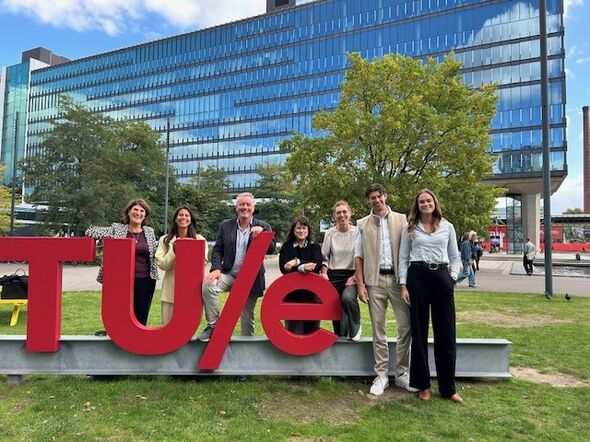"Employees get support faster with new health service"
Much is changing with MasterArbo, the company that acquired the occupational health service on October 1. For example, the service now contacts employees reporting sick after four days, they can diagnose within their own capacity and there will be more options for employees with mental health issues.
Employees who are ill for an extended period are now assigned a new company doctor. Following a recent tender, MasterArbo will now be responsible for the physical and mental well-being of employees at TU/e.
Overall, the university has a low absenteeism rate of 2.9 percent, according to Erna de Vries-Willems from Human Resource Management (HRM). “The national average is around 5.5 percent. So in absolute terms, there isn’t much room for improvement. But what we can do is make sure that those who need support receive it as quickly and effectively as possible.” She believes that MasterArbo is a strong partner in achieving that goal.
By “getting support faster,” she does not mean pressuring employees to recover more quickly, but rather ensuring they do not have to wait for help unnecessarily. Previously, employees who reported sick would receive an invitation from the company doctor after six weeks. Now, a task delegate from the occupational health service, someone with a paramedical background who is authorized to conduct medical inquiries, contacts the employee after just four days. If necessary, the employee can then be invited to see the company doctor within two to three weeks. Roel van der Poort, head of the HRM advisors, is enthusiastic about the new system. “You don’t want to waste time and you want to provide support as quickly as possible where it’s needed.”
Diagnose
The way support is provided has also changed. The introduction of task delegates partially shifts the role of the company doctor, who now maintains oversight from the background. MasterArbo also employs specialists who can make diagnoses, particularly in the area of mental health, says De Vries-Willems. “Of the 2.9 percent absenteeism, 1.2 is due to mental health. It’s therefore crucial that we have this set up properly.” Through the occupational health service, an employee can receive a diagnosis from a psychologist and, if necessary, be referred directly for intervention, such as coaching, psychological treatment, or even mental healthcare services (GGZ).
For employees dealing with mental health, the transition to a new provider is a significant change. HRM staff have made efforts to ensure a smooth transition. De Vries-Willems explains: “Absenteeism guidance has already been transferred to the new occupational health service, but ongoing psychological support or company social work remains with Human Capital Care until the employee’s process is finished.”
All employees who are currently on sick leave have received a letter about the new service. Those who have been sick for more than six months were asked to consent to the transfer of their medical records to the new provider. “Most people agreed to this,” says De Vries-Willems.
Such a handover to a new provided raises the question of how a tender affects the continuity of the occupational health service. University Council member Ellen Konijnenberg already raised this issue in 2021, when the previous provider, Human Capital Care, started its contract. She wondered whether continuity, trust, and support might be better ensured if the occupational health staff were employed directly by the university. In a letter to the University Council, she noted that, even in this tender process, the project group did not first consider whether the existing setup was the best option.
Independent
Although the university could choose to establish its own occupational health service, this is not desirable, De Vries-Willems notes, as independence is better guaranteed with an external provider. “It’s simply important that the company doctor remains independent so they can give the best advice about the employee. Our employees are our greatest asset, and we need to protect that.”
Within HRM, a pilot is already running to hire a dedicated absenteeism specialist. This person can provide support for complex absenteeism cases, De Vries-Willems explains. “In January, we will evaluate whether this specialization adds value for HR advisors at TU/e.”
Tender
For external contracts like this, a tender is mandatory, adds Van der Poort. “Of course, this involves a contract of significant financial volume. The good news is that the process is very transparent.” According to him, the tender process takes a lot of time. “Finding a new provider is quite the circus. So I do hope this will be a long and happy partnership.”
However, that partnership will inevitably end after seven years, as the initial three-year contract can only be extended for a maximum of four more years. MasterArbo will be able to compete again in the next tender, with the same chances as other providers.
Active role
For now, both HRM staff are pleased with the new occupational health service, and managers and supervisors who attended its introduction have responded positively. Van der Poort expects MasterArbo to take an active role in supporting (sick) employees, “for example, by proactively contacting supervisors and initiating dialogue about what the employee needs.” Preventive measures are also part of this approach, says De Vries-Willems: “This morning’s first consultation was a preventive one. I think that’s a positive development.”
A lot of work has gone into the transition, and it will take some time to get used to new people and procedures. But Van der Poort hopes the new service will better meet the needs of TU/e. “And that taking such a major step will prove worthwhile.”
This article was translated using AI-assisted tools and reviewed by an editor.



Discussion